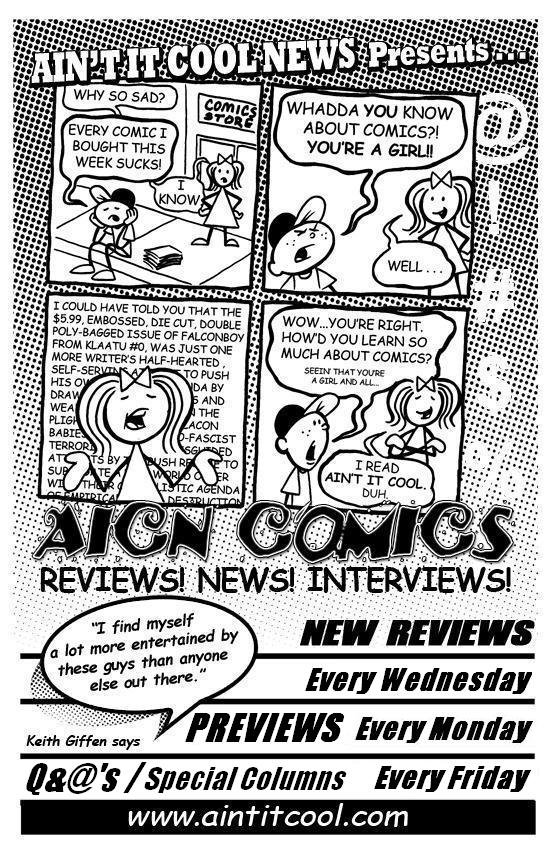
@@@@ What the #$%! is AICN COMICS: Q&@? @@@@
AICN COMICS: Q&@ is our new semi-weekly interview column where some of your favorite @$$Holes interview comic bookdom’s biggest, brightest, newest, and oldest stars. Enjoy this latest in-depth interview filled with @$$y goodness and be sure to look for more AICN COMICS as we gaze into the future of comics every week with AICN COMICS: SPINNER RACK PREVIEWS every Monday and then join the rest of your favorite @$$Holes for their opinions on the weekly pull every Wednesday with AICN COMICS REVIEWS!
Q’s by Lyzard!
@’s by THE BROADCAST writer Eric Hobbs!

Hello, Lyzard here. This October 30th is the 72nd anniversary of Orson Welles’ radio broadcast of H.G. Wells WAR OF THE WORLDS. Eric Hobbs’ first graphic novel, THE BROADCAST from NBM Comics Lit, is a thriller about a rural Indiana town that loses power halfway through this radio play, having never learned the infamous broadcast is a hoax. You can find AICN’s review of the graphic novel here.
LYZARD: What attracted you to telling this story?
ERIC HOBBS (EH): It was a chance to tell an alien invasion story without aliens. Who isn't going to jump at that?! No, I'm always looking for a high concept story to tell and this is about the best high concept I've come up with. People immediately get it when you tell them THE BROADCAST is about a small farm town that loses power halfway through Orson Welles' WAR OF THE WORLDS broadcast. There's always this spark in a fan's eye when I tell him about the book for the first time. He doesn't know what it's about just yet, but he understands that that's a situation that can go in a lot of different directions.Also, I'm a big fan of Romero's zombie movies, and if you look at them, there's always more to them than the flesh-eating monsters chasing people down. I wanted to write something like that -- a disaster story that focused more on the people's reaction to the disaster than the disaster itself. What better way to do that than with a disaster readers know from the jump isn't something to be afraid of at all? I think it's a lot scarier to realize a group might turn against one another when there's no real reason to do so. If they wait the night out, they'll get word the "alien invasion" is a hoax. But they have to make it through the night first.
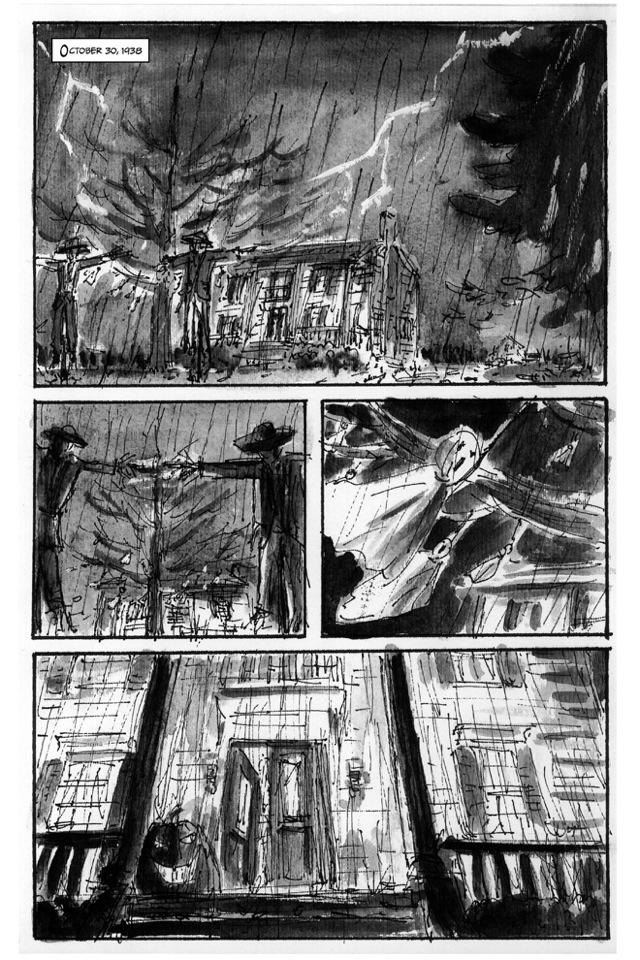
LYZARD: Have you read H.G. Wells' “War of the Worlds”? If so, what do you think of the many adaptations of the classic story?
EH: I've read it, although it's been a while. Every adaptation is different, I guess. I wasn't a fan of the Spielberg-Cruise movie when it came out, but that was largely bitterness on my part. That came out right around the time I started pitching THE BROADCAST, and I couldn't get anyone to read it because of that movie. And yeah, people were actually telling me that. This is a story that can't be pitched without using the words WAR OF THE WORLDS, and the minute those words came out of my mouth everyone threw up their hands and said, "Not me!" No one wanted to be in competition with those guys. I actually caught it on cable the other day and thought it was pretty good. It isn't perfect, by any means, but there's some really risky storytelling in that movie, I think. It grabs you by the throat and doesn't let go. I'm a big fan of the original movie, it came out in 1953 I think. Honestly, I think every alien invasion movie or TV show or novel owes a debt of gratitude to that book, though. It paved the way for everything that's come since, not just the straight adaptations, but stuff like INDEPENDENCE DAY and V and SIGNS -- we're all following in H.G. Wells’ footsteps.LYZARD: How did you get involved with artist Noel Tuazon?
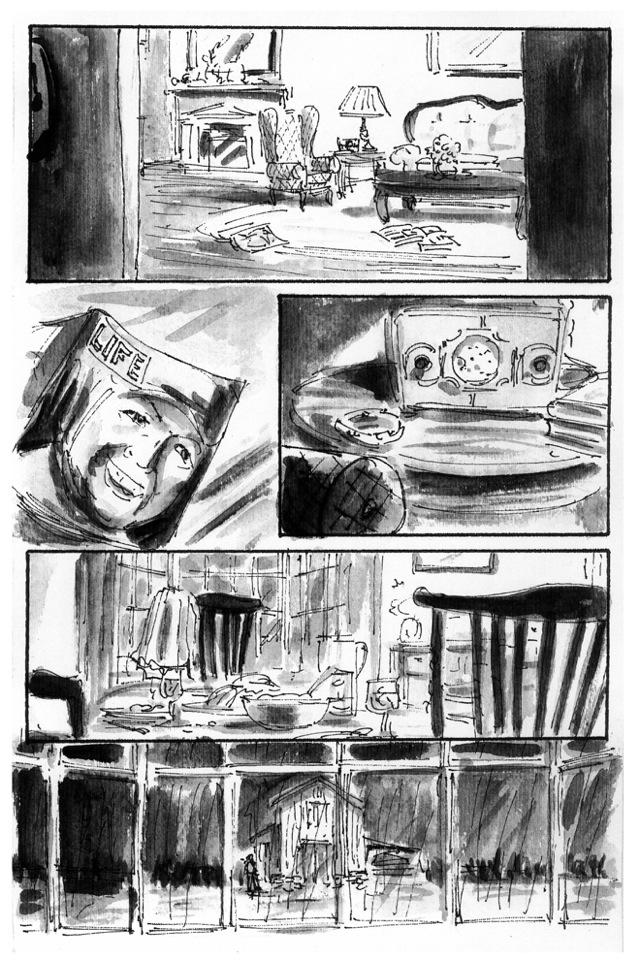 EH: Noel worked on a book called ELK'S RUN that I really enjoyed. That came out right around the time I was taking comics seriously as a writer, and it really inspired me. It was a book that was outside the box as a comic. It wasn't a superhero book. It wasn't horror or sci-fi. It was just this high concept, character driven thriller that didn't feel like anything else on the stand. It was exactly the kind of thing I wanted to write.
EH: Noel worked on a book called ELK'S RUN that I really enjoyed. That came out right around the time I was taking comics seriously as a writer, and it really inspired me. It was a book that was outside the box as a comic. It wasn't a superhero book. It wasn't horror or sci-fi. It was just this high concept, character driven thriller that didn't feel like anything else on the stand. It was exactly the kind of thing I wanted to write.Anyway, a friend suggested Noel, but I wasn't immediately sold on him even though I was a huge fan of that book. As much as I liked his art, I wasn't sure it was the right style for THE BROADCAST. Well, then I started poking around on his website and found a single illustration he had done that was a character sketch he had done while developing a book called TUMOR. It was a completely different style than he used on ELK'S RUN, and I thought it was perfect for this book. Somehow I convinced him to come onboard, and just like that, I was working with a Harvey-nominated artist.
LYZARD: Did you have any input on the artistic style of the graphic novel?
EH: Not really. All I really did was point to that one character sketch and asked if we could do a whole book in that style. When he said yes, we got the ball rolling from there.
LYZARD: What is your writing process?
EH: I'm all over the map, really. I write a lot of drafts. I'm usually on my fourth or fifth draft before I even think to send it out to someone.Also, I've gotten in the habit of writing a story from beginning to end in screenplay format before breaking it down into pages-and-panels for the comic. For me, I need those characters to be fully realized and the story structure to be in place before I even start thinking about how it will appear on the page. I'm not good enough to do all that at the same time.
LYZARD: How long was the process of creating the comic, then how long did it take to find a publisher?
EH: It depends on how much time an artist can dedicate to a project. Noel is known for being very fast, but THE BROADCAST took him a few years to finish -- mostly because he was doing other projects alongside this one.Finding a publisher took a loooooong time. I didn't have a lot of connections in the industry when I started pitching the project around so I was just sending it to editors blind. I would send a few out, wait for the rejections to come in -- then send out a couple more. Getting that first deal is so much work, creating the book is really pretty easy in comparison.
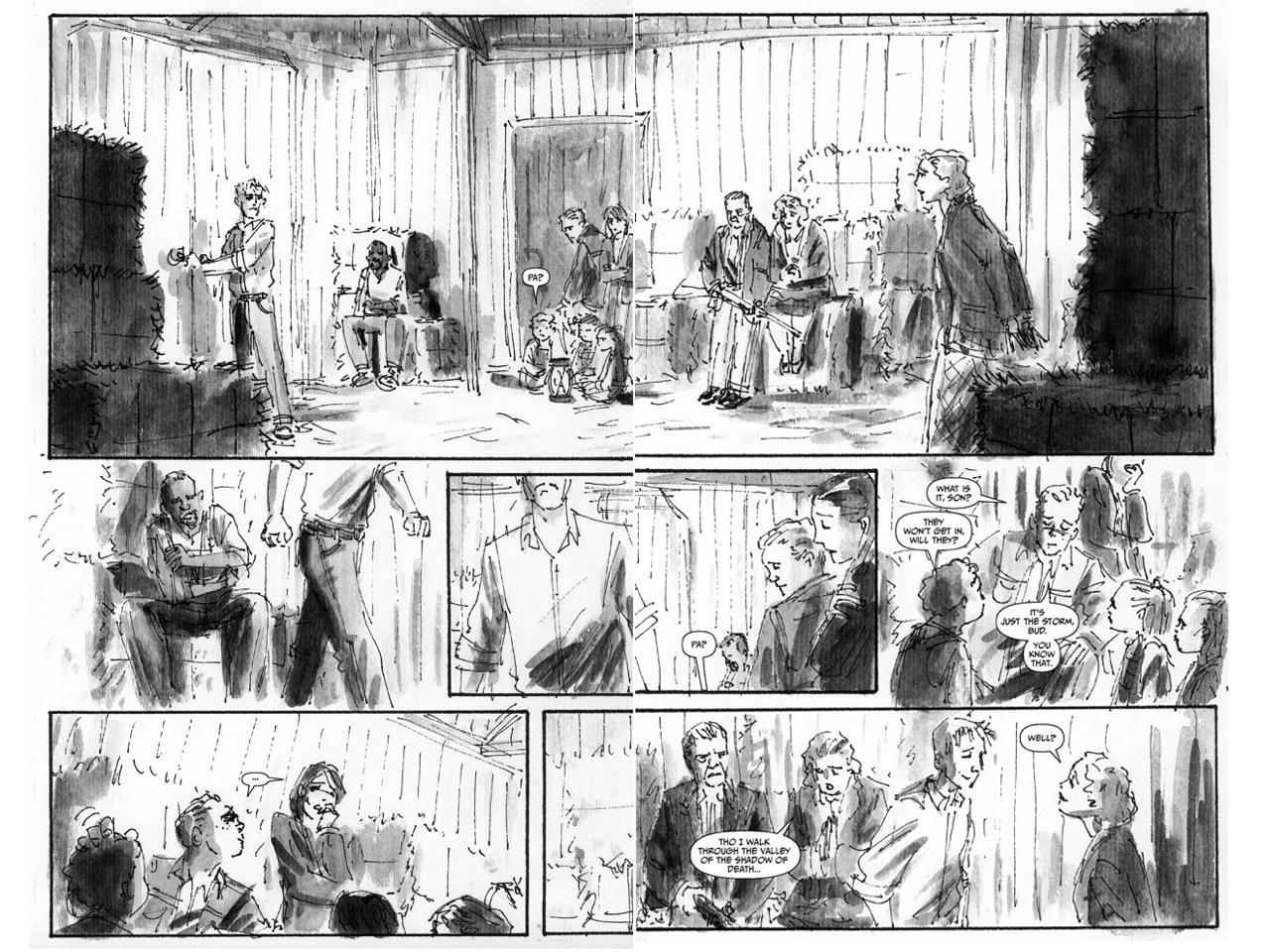
LYZARD: What are some of your influences, in and outside of comics?
EH: Oh, man. There's too many to name, really.Recently, I was a huge fan of LOST. Borderline obsessive. But...
Stephen King, Mark Twain, Brian Vaughan, JJ Abrams, Aaron Sorkin, Stephen Spielberg, Rod Serling, Jeff Lemire, Joe Hill, Martin Scorcese, Ray Bradbury, those new books from Darwyn Cooke -- I've been treating those like textbooks more than comics. I'm really geeking out on DEXTER and MAD MEN right now. Somehow I missed both these when they started so I've been catching up with them on DVD.
I don't know. I could go on and on. There's really no rhyme or reason to the list. Whether it’s comics, movies or TV -- if it's a genre story that's character-driven, I'm usually going to get behind it and find something to take away. Also, if you've written something that both entertains and has something to say, chances are your work is somewhere on my list too.
LYZARD: What do you see as the future for the comic industry?
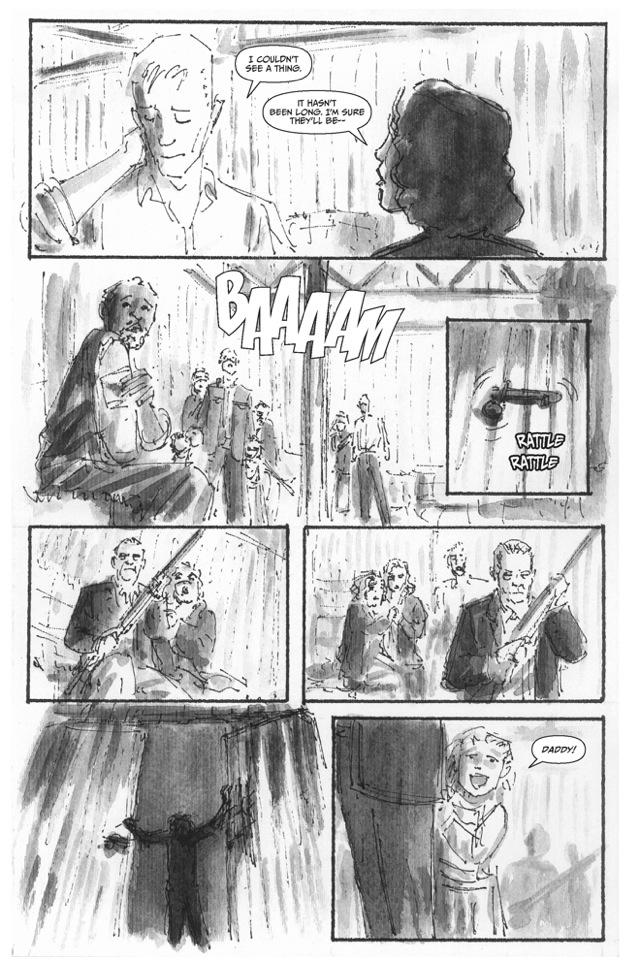 EH: That's being talked about a lot these days. We're in a real state of flux as digital comics become a little more mainstream and comics sales keep going down. Print comics are never going to go away, but monthly comics might. I think you'll start seeing a transition, especially in the indie ranks, where digital comics replace the monthly comics we're seeing now and a book goes straight to a trade paperback if it's going to see print.
EH: That's being talked about a lot these days. We're in a real state of flux as digital comics become a little more mainstream and comics sales keep going down. Print comics are never going to go away, but monthly comics might. I think you'll start seeing a transition, especially in the indie ranks, where digital comics replace the monthly comics we're seeing now and a book goes straight to a trade paperback if it's going to see print.I also think you'll start seeing some of the big publishers create books that are designed more and more for the book market than the comic shop. I'm a comic creator, but I don't really know what's going on in the books at Marvel and DC. That's a problem. If I walk into a Barnes & Noble I don't know what books I can pick up because most of them weren't written to be bought like that -- they're written as 22-page episodes in one long, extended story that been going on for years. I can go into Best Buy and I know that if I buy “Spiderman 2” on DVD, I don't need to have seen the first one to understand what is going on. That isn't true of comics, but it should be.
 Don't get me wrong. I don't have a problem with a series of books. But if we want new readers to start buying comics again, well, as an industry we'll have to make some changes and take some chances. We need more books that are paced like novels or movies. That's a structure people already understand. And we need to create more books that have a beginning, middle and end. Sure, you can have the characters evolve throughout a series -- but you can't expect someone new to pick up a book if they need to know key plot points from a series that was published ten years ago.
Don't get me wrong. I don't have a problem with a series of books. But if we want new readers to start buying comics again, well, as an industry we'll have to make some changes and take some chances. We need more books that are paced like novels or movies. That's a structure people already understand. And we need to create more books that have a beginning, middle and end. Sure, you can have the characters evolve throughout a series -- but you can't expect someone new to pick up a book if they need to know key plot points from a series that was published ten years ago.Long story short, you're going to see some big changes.
LYZARD: How hard (or easy) was it for you to break into the comic book world?
EH: To a large extent I'm still breaking in. I've got my foot in the door, and that helps -- but it's not like I have editors knocking down my door. I don't think I'm on Marvel or DC's radar quite yet. THE BROADCAST has been getting great reviews, which helps, but I really feel like my work is just beginning. If you aren't careful the door will close on you quickly. I don't know which is harder, fighting to get in -- or fighting to stay in.LYZARD: When did you first fall in love with comics? What are some of your favorite books and/or characters?
EH: I didn't pick up my first comic until I was something like twenty-four years old, which is kind of crazy.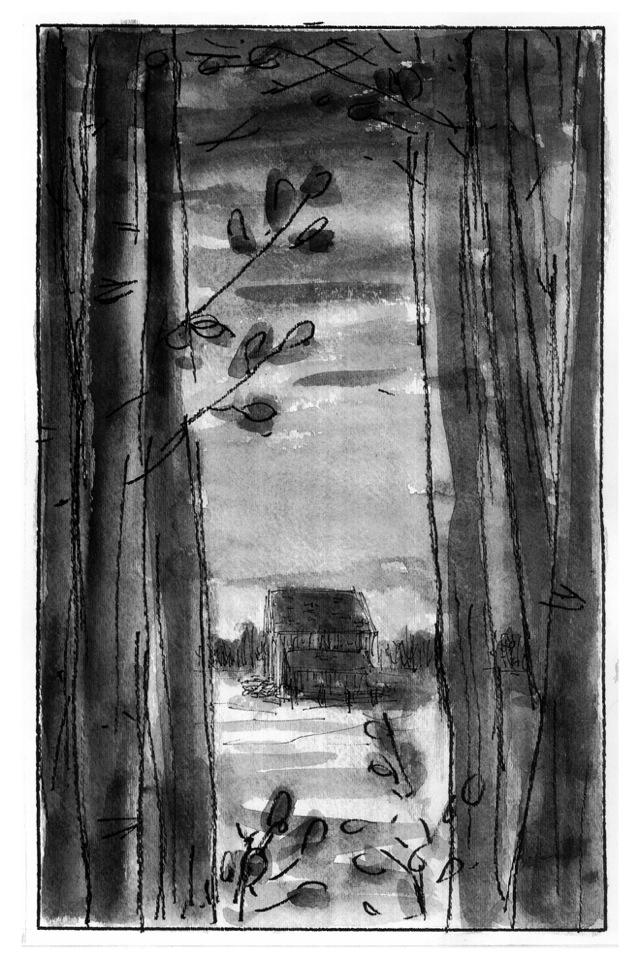 I was working in a restaurant at the time and befriended a guy there who was trying to make it as an artist. Anyway, one day we get to talking and realize that we'd make a pretty good team. The only problem? I'd never opened a comic in my life. So he comes in the next day with a copy of WATCHMEN, DARK KNIGHT RETURNS and an old beat-up copy of the DARK PHOENIX saga. It was all over for me after that.
I was working in a restaurant at the time and befriended a guy there who was trying to make it as an artist. Anyway, one day we get to talking and realize that we'd make a pretty good team. The only problem? I'd never opened a comic in my life. So he comes in the next day with a copy of WATCHMEN, DARK KNIGHT RETURNS and an old beat-up copy of the DARK PHOENIX saga. It was all over for me after that.LYZARD: What would be your dream comic book job?
EH: Well, again, I'm something of an anomaly because I didn't grow up reading comics so I don't have this laundry list of characters that I've dreamed to write since I was six years old. I think I have a pretty interesting take on Superman if that opportunity ever presents itself. Hopefully, it will.Really, though, I'm trying to make sure I don't get too far ahead of myself. It's exciting to have a book that's so well-received, but I don't want to assume that means publishers will start throwing buckets of cash at me to offer my take of their most iconic characters. If it comes, it comes. But right now, my dream project is the one I'm lucky enough to be working on right now.
LYZARD: Are there any other projects of yours you’d like to discuss?
 EH: AWAKENINGS. It's been a long road on that one, but it's finally going to be finished up and collected by Arcana in the first part of the new year. When I'm at a convention I always tell people that it's a cross between MINORITY REPORT and THE HOWLING. That usually gets a raised eyebrow or two. It's about a New York detective who’s on the trail of a gruesome serial killer only to find himself on the run when every lead points to the one person he never would have suspected -- himself. However, as he fights to clear his name he discovers a supernatural presence behind the killings and begins to realize he might be the lead suspect for a very good reason.
EH: AWAKENINGS. It's been a long road on that one, but it's finally going to be finished up and collected by Arcana in the first part of the new year. When I'm at a convention I always tell people that it's a cross between MINORITY REPORT and THE HOWLING. That usually gets a raised eyebrow or two. It's about a New York detective who’s on the trail of a gruesome serial killer only to find himself on the run when every lead points to the one person he never would have suspected -- himself. However, as he fights to clear his name he discovers a supernatural presence behind the killings and begins to realize he might be the lead suspect for a very good reason.Also, I have an all-ages series that is getting a lot of interest from publishers. I think we'll have that set up pretty soon. That's my passion project right now, but it's probably too soon to start talking about it just yet.
LYZARD: The graphic novel THE BROADCAST is available for purchase now. You can find more information on Eric Hobbs’ website which also features a 21-page preview of the comic, the original Orson Welles radio play, and a link to Amazon to purchase the book. Thanks to Mr. Hobbs for participating in this interview.
Lyzard is actually Lyz Reblin, a film student at Chapman University. Lyz’s love for comics stems from an internship at Dark Horse Entertainment as a freshman, which may explain why some of her favorite comic book writers are Gerard Way and Steve Niles. You can find her on Facebook, but only if you follow her band: Castle Town Convicts (possibly a Zelda reference?).